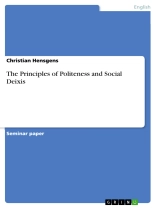Seminar paper from the year 2005 in the subject English Language and Literature Studies – Linguistics, grade: 2, University of Cologne, course: Pragmatics and Speech Act Theory, language: English, abstract: „Have a look over there! You will have to do that next week.“ If we wanted to follow and to join this conversation, we would need to know different pieces of information from the extralinguistic context: Where and when did the action take place? And finally, who are the speaker and the addressee? The tokens “there”, “you”, “that”, and “next week” can be described as deictic expressions or – for short – deictics (THOMAS 1995: 9). The term “deictic expression” comes from the Greek word deiktikós (“pointing at”) (BUßMANN 2002: 149). Lyons defines deixis to be “the location and identification of persons, objects, events, processes, and activities being talked about, or referred to, in relation to the spatiotemporal context created and sustained by the act of utterance and the participation in it, typically, of a single speaker and at least one addressee” (JARVELLA / KLEIN 1982: 35).
We are frequently faced with deictic expressions in everyday-languagewhether consciously or unconsciously – in the way that we refer to persons, places, times, and various different other things. Thereby, we would receive a demand such as “Do this!” or “Keep out!” as much more rude and aggressive than a – more politely
– demand such as “Would you mind to do this?” or “Please, do not disturb”. Obviously, we are able to feel the delicate differences between both demands while speaking and we seem to be able to make adequate use of these differences. Why is that so? Why do we receive two demands with quite the same content in different ways? What are these differences like, how are they received, and which advantages does a speaker gain from either using the one expression or the other? It seems that deixis and politeness are connected in a way and that the use of different deictic expressions also has different effects on the politeness expressed through these deictic expressions. Insofar, it can be stated that we are just on the interface between deixis and politeness.
My aims are to find answers to the questions above, to give an overview of the prevailing politeness principles, and to draw a connection to social deixis in particular. I will first organize the different categories of deixis and then concentrate on the politeness principles developed by Brown and Levinson.
Christian Hensgens
The Principles of Politeness and Social Deixis [PDF ebook]
The Principles of Politeness and Social Deixis [PDF ebook]
¡Compre este libro electrónico y obtenga 1 más GRATIS!
Idioma Inglés ● Formato PDF ● ISBN 9783638350846 ● Tamaño de archivo 0.6 MB ● Editorial GRIN Verlag ● Ciudad München ● País DE ● Publicado 2005 ● Edición 1 ● Descargable 24 meses ● Divisa EUR ● ID 3701187 ● Protección de copia sin












